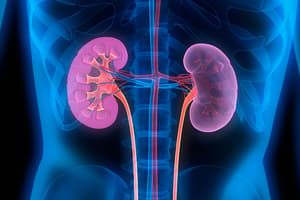Podcast
Questions and Answers
How do kangaroo rats conserve water?
How do kangaroo rats conserve water?
- By excreting diluted urine
- By sweating profusely
- By having kidneys that dilute urine
- By concentrating urine and retaining water (correct)
What type of rock do most fossils get preserved in?
What type of rock do most fossils get preserved in?
- Volcanic
- Sedimentary (correct)
- Igneous
- Metamorphic
What is the white paste that birds excrete known as?
What is the white paste that birds excrete known as?
- Uric acid (correct)
- Urea
- Ammonia
- Creatinine
Why are kidneys that can conserve water essential to homeostasis?
Why are kidneys that can conserve water essential to homeostasis?
Which animals have a three-chambered heart?
Which animals have a three-chambered heart?
How can viral diseases be prevented and treated?
How can viral diseases be prevented and treated?
Flashcards are hidden until you start studying
Study Notes
Kangaroo Rat Water Conservation
- Kangaroo rats live in arid deserts where water is scarce.
- They have adapted to conserve water through several mechanisms.
- They obtain most of their water from food, particularly seeds.
- Their concentrated urine minimizes water loss.
- They have efficient kidneys that reabsorb water.
- They are nocturnal, minimizing water loss through sweating during the day’s heat.
Fossil Preservation
- Sediments play a crucial role in fossil preservation.
- Most fossils are found in sedimentary rocks, which are formed from layers of sediments over time.
- These sediments can bury organisms quickly, preserving their remains.
- Examples of sedimentary rocks include limestone, sandstone, and shale.
Bird Excretion
- Birds excrete a white paste known as urate.
- It is a combination of uric acid and other waste products.
- Urate is white or yellowish in color and typically has a pasty texture.
- Birds use urate excretion as a way to conserve water by minimizing water loss in their waste.
Kidney Function and Homeostasis
- Kidneys play a vital role in maintaining homeostasis, the balance of internal conditions within an organism.
- Kidneys filter waste from the blood and produce urine.
- In arid environments, water conservation is crucial for survival.
- Kidneys that can efficiently reabsorb water and produce concentrated urine are essential for maintaining homeostasis in these conditions.
Three-Chambered Heart
- Amphibians have a three-chambered heart.
- Two atria and one ventricle.
- The heart pumps blood throughout the body, but it does not separate oxygenated and deoxygenated blood efficiently.
Viral Disease Prevention and Treatment
- Prevention is the best defense against viral diseases.
- Measures like vaccination and hygiene help prevent viral infection.
- Treatments for viral infections aim to manage symptoms and support the body's immune response.
- Antiviral medications can target specific viruses and slow their reproduction.
- Some antiviral drugs are effective against certain viruses, but no single drug can treat all viruses
- Lifestyle changes, such as adequate rest and hydration, can also help with recovery.
Studying That Suits You
Use AI to generate personalized quizzes and flashcards to suit your learning preferences.



